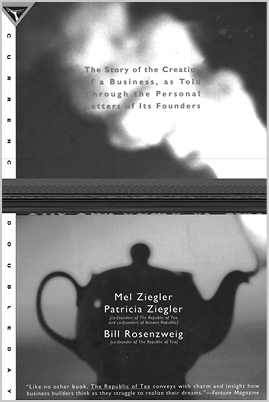The Republic of Tea
MEL ZIEGLER, PATRICIA ZIEGLER, AND BILL ROSENZWEIG
Reviewed by Todd

I love it when Jack tells stories about the beginnings of 800-CEO-READ. I always listen, rapt—wondering how three shelves in the back of a bookstore could have turned into a fifteen-person, multimillion-dollar operation, wondering what it was that Jack did that allowed us to survive as we have against big-box retailing and Internet commerce, wondering how the dynamic culture formed. I search for some meaning in our past to understand the company we have become. No definitive written history exists for the conception of 800-CEO-READ, or for most companies, for that matter. I think that is why I enjoyed The Republic of Tea so much. It is the genesis story of a company and its quest to change the world with tea.
Mel Ziegler, the entrepreneur behind Banana Republic, found his clothing company had over time developed “its own mind” and he was becoming increasingly at odds with his progeny. After deciding to sell the clothing retailer, and still recovering from the painful separation, the disillusioned entrepreneur serendipitously found himself on an airplane sitting next to Bill Rosenzwieg. Bill was on a search to find a living he could love. The two shared one of those life-changing conversations, and The Republic of Tea is a record of their correspondence over twenty months. These reproductions of faxes and letters between Mel, Bill, and Mel’s wife Patricia that make up The Republic of Tea chronicle the evolution of an idea into a business.
Rosenzweig was immediately swept up by Ziegler’s zen-inspired descriptions for how tea can create a different state of mind. They both imagined the Republic as a place, physical and psychological. Patricia’s illustrations, sprinkled throughout the book, bring a visual sense to the ideas brewing among the three. Stores, serving sets, tea blends for children, and water for tea bottled at the source of the Yangtze River all burst forth as potential paths of creativity in the initial weeks of their conversation.
The shared euphoria propelled both men forward, then gave way to practicality. Rosenzweig shifted his focus to understanding the mechanics of the tea market. Trips to the supermarket, conversations with tea brokers, and Lexus-Nexus searches provided a rough sketch of the world they were moving into. Imagined organizational charts and an evolving product portfolio added more concreteness. The would-be entrepreneur will appreciate Rosenzweig’s thoroughness and preparation, but some of the details conveyed in his communiqués with Ziegler foreshadow problems ahead.
“As for my role, I got him pregnant.”
Tension grew between the two partners. Ziegler felt that Rosenzweig was more interested in talking about the business than in starting the business. Rosenzweig was uncertain, acknowledging in added notes to the book that he needed Ziegler for direction and support. Ziegler, sensing that uncertainty, made his role clear: he was happy to mentor and possibly invest in the unformed company, but would contribute no further. Confidence wavering, Rosenzweig abandoned the Republic and took a job at a friend’s design firm, vowing to bootstrap the tea business.
Rosenzweig returned to the idea with a new energy after a year had passed with no real progress. This time he would stand on his own. He needed to become an expert in tea. He spent an intense month in London at the center of the world tea trade, learning such particulars as how to identify a first-flush from a second-flush Darjeeling. He also resumed talks with Ziegler, this time with new expectations: “I stopped waiting for him to lead the way into the tea business because it was finally clear that if I didn’t start it, no one else would.” The Republic of Tea was incorporated by the three authors in 1992. Their idea had finally blossomed into a business.
Insights abound in The Republic of Tea, conveying the yin and yang of entrepreneurship. The book captures the rush of a new entrepreneurial idea, the unforgiving practicality of the marketplace, and how, in the end, the only indicator you can trust is your heart. Shortly after Rosenzweig rediscovered his passion for the project, he asked Ziegler when the right time to start a business is. Ziegler answered, in his usual thoughtful manner, “Never and always.” TS
The Republic of Tea: The Story of the Creation of a Business, as Told Through the Personal Letters of Its Founders, Currency/Doubleday, Paperback 1994, ISBN 9780385420570
WHERE TO NEXT?
 Here for
why we buy
Here for
why we buy  Here for
the magic of journeys
Here for
the magic of journeys  Here for
the power of experiences | EVEN MORE: Brewing Up a
Business by Sam Calagione;
Pour Your Heart into It by Howard Schultz and Dori Jones Yang;
Typo by David
Silverman; The Dip
by Seth Godin
Here for
the power of experiences | EVEN MORE: Brewing Up a
Business by Sam Calagione;
Pour Your Heart into It by Howard Schultz and Dori Jones Yang;
Typo by David
Silverman; The Dip
by Seth Godin